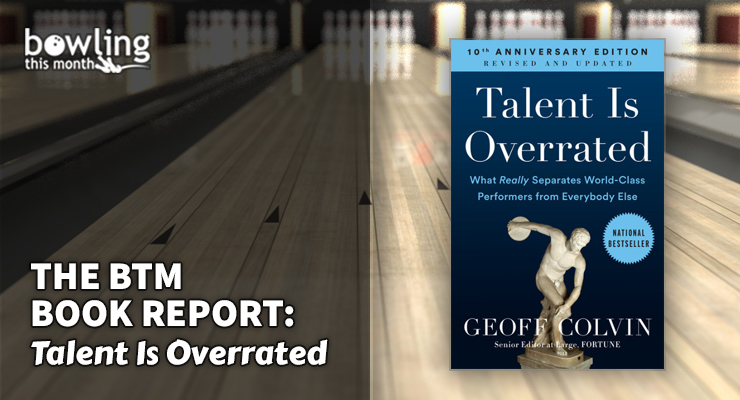Geoff Colvin’s Talent Is Overrated is another book in the growing literature about performance. Written mostly from a business perspective, it approaches the topic by taking examples from the top performers in well-studied domains such as sports and music and relating them to the business world. From NFL Hall of Fame wide receiver Jerry Rice to former GE CEO Jeffrey Immelt, Colvin presents what separates world-class performers from everyone else.
Before discussing the core theme of the book, Colvin discusses the concept of innate talent. Like many of his peers in this area, the conclusion is that while innate talent might exist, there isn’t much evidence to support its value. Even if someone is considered “talented,” it takes a great deal of time and effort in order to develop that potential into world-class performance. Malcolm Gladwell’s Outliers and Daniel Coyle’s The Talent Code (discussed in detail and adapted to bowling by Dean Champ in his series of articles) both raise the same arguments.
Instead, the book presents “deliberate practice” as the only sure path to world-class performance as researched by Anders Ericsson, and discusses the challenges in meeting the criteria involved such as design, feedback, mental challenge and, as Colvin puts it, that fact that “it isn’t much fun.” On the other hand, if this kind of activity were easy and enjoyable, everyone would do it, and there wouldn’t be separation between the world-class performers and everyone else.
Why does deliberate practice work? Colvin presents several mental processes that develop with deliberate practice that are highly important to bowlers:
- Perceiving more: Top tennis players are able to “predict” where a serve is going by watching different cues, which allows them to react faster than lesser-skilled players. Top performers understand details better, look further ahead, and can make more use of available information than average performers.
- Knowing more: In chess, it took a long time for a computer to beat the best human chess players, despite their advantage in processing power. Unsurprisingly, the advantage of top performers is their deep knowledge of their field, and not just superior reasoning skills.
- Remembering more: Again, using chess as an example, world-class players can remember board setups much better than the average person, provided that they are arranged in a way they recognize from game play. If placed at random, elite players are no better than average players at remembering the setups. This kind of contextual memory provides insight into the memory abilities of specialists in a given domain.
Finally, two of the key points made early in the book, and discussed in more detail later, are the importance of feedback and motivation. The value of objective feedback in anyone’s development is important, but the challenge is sometimes in collecting it and understanding it.
As for motivation, if ...
This article is only available to Bowling This Month subscribers. Click below to get instant access to this article and all of our other premium instructional content.
Subscribe to Bowling This Month
Already a Bowling This Month subscriber? Click here to log in.
